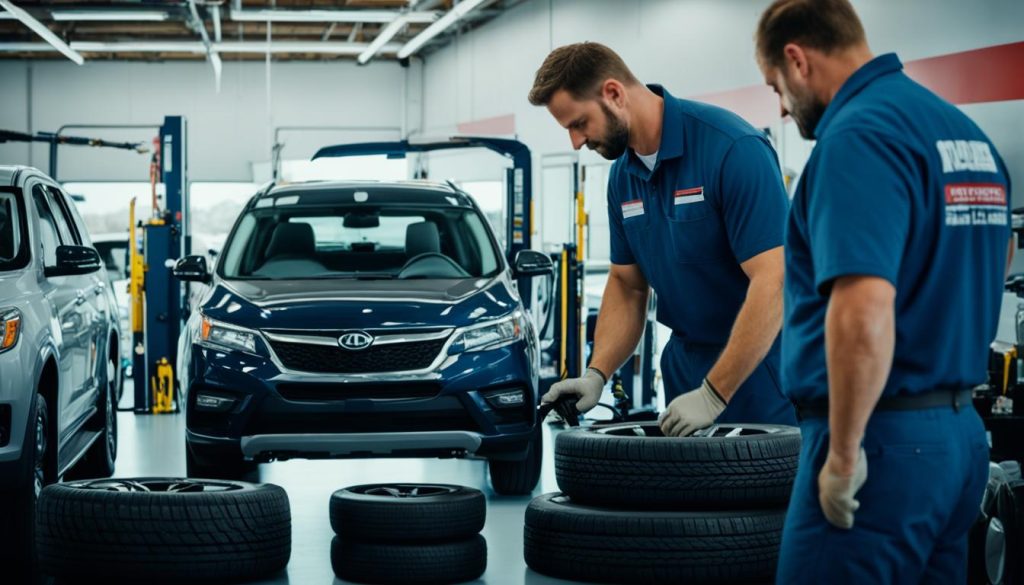
Navigating Insurance Claims with Our Expert Assistance

Repairing Minor Collision Damage: Quick and Affordable Solutions
For businesses that rely on a fleet of vehicles, regular maintenance and prompt repairs are essential for minimizing downtime and ensuring operational efficiency. Whether it’s delivery vans, service trucks, or company cars, these vehicles are the lifeblood of operations. However, keeping a fleet running smoothly requires more than just routine oil changes and tire rotations. Effective fleet vehicle maintenance and repair strategies are crucial for minimizing downtime, reducing costs, and ensuring the safety of drivers and cargo.
Key Takeaways
- Regular fleet vehicle maintenance is crucial for minimizing downtime and ensuring operational efficiency.
- Proactive preventive maintenance can help preserve vehicle longevity and reduce long-term costs.
- Utilizing advanced diagnostic technology can aid in early issue identification and timely repairs.
- Comprehensive driver training and a culture of accountability are essential for maintaining fleet safety and compliance.
- Partnering with trusted service providers can provide specialized expertise and access to a wide range of fleet maintenance services.
The Importance of Regular Fleet Vehicle Maintenance
As fleet managers, we understand the crucial role that regular vehicle maintenance plays in the success of our business. Maintaining our fleet of vehicles is not only essential for minimizing downtime and ensuring operational efficiency but also crucial for preserving the longevity of our assets and reducing overall costs.
Minimizing Downtime and Ensuring Operational Efficiency
By adhering to a well-structured fleet service and vehicle maintenance program, we can identify and address potential issues before they escalate into costly breakdowns. This proactive approach helps us avoid unexpected service interruptions, ensuring that our fleet remains on the road and our business operations continue uninterrupted. Reduced downtime translates to increased productivity, which ultimately benefits our bottom line.
Preserving Vehicle Longevity and Reducing Costs
Regular maintenance of our business fleet not only keeps our vehicles running smoothly but also helps extend their lifespan. Well-maintained vehicles are less prone to premature wear and tear, which means we can maximize the return on our investment and delay the need for costly replacements. Additionally, properly maintained vehicles tend to be more fuel-efficient, leading to significant cost savings over time.
By prioritizing fleet service and vehicle maintenance, we can proactively address issues, minimize downtime, preserve the longevity of our assets, and ultimately reduce the overall costs associated with operating our business fleet. This strategic approach ensures that our fleet remains reliable, efficient, and cost-effective, positioning us for long-term success.
Preventive Maintenance: A Proactive Approach
Maintaining the health and longevity of your fleet vehicles is crucial for seamless operations and cost-effective management. At the heart of this lies preventive maintenance, a proactive approach that allows us to identify and address potential issues before they escalate into costly problems.
Routine Tasks and Scheduled Inspections
Preventive maintenance encompasses a range of routine tasks and scheduled inspections designed to keep your vehicles running at their best. Regular oil changes, fluid checks, filter replacements, and tire rotations are essential for preserving the integrity of your fleet. By adhering to a comprehensive preventive maintenance schedule, you can extend the lifespan of your vehicles and minimize the risk of unexpected breakdowns.
Identifying and Addressing Potential Issues Early
- Regular vehicle inspections are a cornerstone of preventive maintenance, allowing you to catch potential problems in their early stages.
- Our experienced technicians meticulously examine each vehicle, looking for signs of wear, damage, or impending issues that could impact fleet maintenance.
- By addressing these concerns promptly, we can prevent minor issues from escalating into major repairs, ultimately reducing downtime and keeping your vehicles on the road.

Embracing a proactive approach to preventive maintenance is the key to optimizing the performance and longevity of your fleet. By investing in regular inspections and timely repairs, you can ensure your vehicles remain in top condition, minimizing costly downtime and maximizing your return on investment.
Fleet Vehicle Maintenance and Diagnostic Technology
Staying on top of fleet maintenance is crucial for businesses that rely on a robust vehicle fleet. Fortunately, advancements in diagnostic technology have revolutionized the way we approach fleet maintenance. By incorporating these cutting-edge tools, fleet managers can gain unprecedented insights into the health and performance of their vehicles.
One of the key benefits of integrating vehicle diagnostics into fleet maintenance is the ability to detect issues before they escalate. Advanced diagnostic systems can identify engine malfunctions, faulty sensors, or impending component failures with remarkable accuracy, allowing businesses to address problems proactively. This not only minimizes downtime and ensures operational efficiency but also helps preserve the longevity of their vehicles.
Alongside diagnostic tools, telematics systems have become an indispensable asset for modern fleet management. These integrated systems combine GPS tracking with real-time vehicle data, providing fleet managers with a comprehensive view of their fleet’s performance. By monitoring factors like fuel efficiency, engine health, and driver behavior, businesses can optimize routes, enhance driver safety, and make data-driven decisions to improve their overall fleet operations.
By leveraging the power of diagnostic technology and telematics, fleet managers can stay ahead of the curve, anticipate maintenance needs, and ensure their vehicles are running at peak performance. This not only enhances the overall efficiency of the fleet but also contributes to significant cost savings in the long run.
Regular Inspections: Ensuring Compliance and Safety
Maintaining a fleet of vehicles requires more than just routine maintenance. Regular vehicle inspections play a crucial role in ensuring compliance with safety regulations and identifying potential hazards. As fleet operators, we must prioritize the safety of our drivers, passengers, and other road users.
Adhering to Safety Regulations and Industry Standards
Fleet safety is not just a moral obligation but also a legal requirement. We must adhere to a comprehensive set of safety regulations and industry standards to avoid penalties and protect the reputation of our business. This includes conducting thorough inspections of our vehicles, documenting any issues, and addressing them promptly to maintain compliance.
Identifying Potential Safety Hazards
- Regular inspections help us identify worn or damaged components that could compromise the safety of our vehicles, such as faulty brakes, worn tires, or malfunctioning lighting systems.
- By proactively addressing these issues, we can mitigate the risk of accidents and ensure the continued roadworthiness of our fleet.
- Maintaining a comprehensive inspection program not only protects our drivers and the public but also safeguards our business from potential liability.

Investing in a robust vehicle inspection program is a critical aspect of fleet management. By adhering to safety regulations, industry standards, and proactively identifying potential hazards, we can ensure the safety and compliance of our fleet, ultimately contributing to the overall success and reputation of our organization.
Training and Education: Empowering Drivers
Effective fleet maintenance extends beyond the confines of the garage. It involves empowering drivers with the knowledge and resources to identify and report potential issues with their vehicles. At the heart of this approach is a comprehensive vehicle inspection training program that equips drivers with the skills they need to contribute to the overall health and performance of the fleet.
Providing Comprehensive Vehicle Inspection Training
By educating drivers on vehicle inspection procedures, maintenance protocols, and safe driving practices, we can ensure that they are well-equipped to detect and report any abnormalities or concerns. This proactive approach not only enhances the drivers’ understanding of their vehicles but also fosters a sense of ownership and accountability.
Encouraging a Culture of Accountability and Communication
Fostering a culture of open communication and accountability is crucial for effective fleet maintenance. We encourage our drivers to promptly report any issues or observations, creating a seamless feedback loop between the drivers and the maintenance team. Regular check-ins and open dialogue facilitate the timely resolution of problems, minimizing downtime and maximizing productivity.
By investing in the training and education of our drivers, we empower them to be active participants in the maintenance and care of our fleet. This collaborative approach not only enhances the overall efficiency of our operations but also instills a sense of pride and ownership among our drivers, ultimately contributing to the long-term success of our fleet management strategies.
In summary, comprehensive driver training and a culture of accountability are essential components of an effective fleet maintenance program. By equipping our drivers with the necessary knowledge and resources, we can unlock their full potential as valuable partners in ensuring the safety, reliability, and longevity of our fleet.
Partnering with Trusted Service Providers
In the world of fleet maintenance, partnering with trusted service providers can be a game-changer. While our internal maintenance capabilities are crucial, leveraging the expertise and resources of reputable mechanics, auto shops, and dealerships can provide invaluable support to our fleet operations.
Accessing Specialized Services and Technical Expertise
Outsourcing certain maintenance tasks, such as complex engine diagnostics or intricate repairs, to qualified professionals can streamline our operations and ensure that our vehicles receive the attention they need promptly. These service providers often have access to specialized equipment, genuine parts, and technical knowledge that may not be readily available within our in-house team.
Vetting Potential Service Providers
When it comes to selecting service providers, it’s essential to conduct thorough vetting to ensure we’re partnering with the right fit. We carefully evaluate factors such as:
- Reputation and industry standing
- Proven track record of quality work and timely service
- Transparent communication and clear expectations
- Competitive pricing and cost-effective solutions
- Commitment to safety and compliance
By establishing strong relationships with trustedservice providers, we can leverage their specialized expertise, optimize ourfleet maintenanceprocesses, and ensure the ongoingauto repairand care of our vehicles.
Conclusion: Data-Driven Decision Making for Continuous Improvement
At the heart of an effective fleet management strategy lies the power of data analytics. By harnessing the wealth of information gathered from our fleet’s maintenance records, performance metrics, and cost data, we can make informed decisions that drive continuous improvement. Analyzing these insights allows us to identify trends, patterns, and areas that require our attention, empowering us to optimize our maintenance program and maximize the efficiency and reliability of our fleet.
Leveraging predictive analytics and maintenance forecasting tools, we can anticipate future maintenance needs and potential risks, enabling us to adopt a proactive approach. This proactive mindset not only minimizes costly downtime but also ensures the optimal utilization of our fleet assets, ultimately contributing to the long-term success and sustainability of our business.
Investing in a comprehensive fleet management program that integrates data-driven decision making is a strategic investment. By utilizing fleet management, data analytics, and maintenance optimization practices, we can achieve significant cost savings, enhance operational efficiency, and maintain a competitive edge in the industry. This data-centric approach empowers us to make informed decisions, continuously refine our strategies, and ultimately drive the success of our fleet operations.



